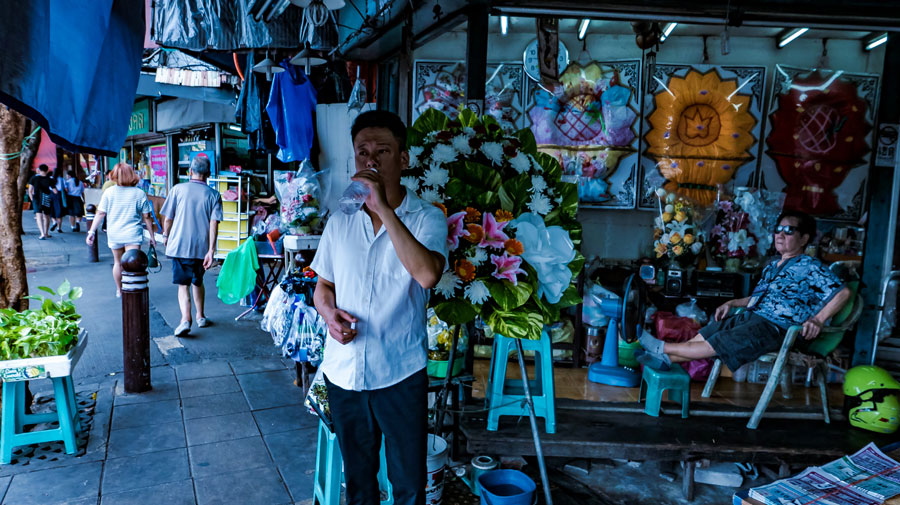
Days
Rizi
Taiwan, 2019
Dirección: Tsai Ming-Liang
Guion / Script: Tsai Ming-Liang.
Producción / Production: Claude Wang.
Fotografía / Cinematography: Chang Jhong-Yuan.
Edición / Film editing: Chang Jhong-Yuan.
Intérpretes / Cast: Lee Kang-Sheng, Anong Houngheuangsy.
Duración: 127 minutos
Kang vive solo en una casa grande. A través de la fachada de vidrio mira los árboles sacudidos por el viento y la lluvia. Siente un extraño dolor de origen desconocido que apenas puede soportar. Kang se masajea el cuello y hace una mueca, sugiriendo que el dolor que su personaje padecía en su film El río , todavía lo atenaza veinte años después. Non vive en un pequeño departamento en Bangkok, donde metódicamente prepara platos tradicionales de su aldea natal. Cuando Kang se encuentra con Non en una habitación de hotel, ambos comparten sus soledades.
"Este film carece de subtítulos intencionadamente", reza un cartel al principio de la película. Y el espectador entiende que las intenciones de Tsai Ming-liang son hacerle entrar en el ritmo particular de su film, donde la lentitud, la quietud y el silencio, reinan. Sin embargo, los dos hombres solos se encuentran y en el observar silencioso de ese encuentro quizás haya olvido y haya verdad y calidez y sentido y belleza. Seguramente Days expulse a muchos –del film, de la sala– pero aquellos que se entreguen a su ritmo, encontrarán una exploración profunda de la condición humana. Un film agudo y conmovedor que marca la reconciliación del cineasta con temas como la sexualidad y el deseo, que han marcado a su cine desde los comienzos.
Kang lives alone in a big house. Through a glass façade, he looks out onto the treetops lashed by the wind and the rain. He feels a strange pain of unknown origin which he can hardly bear. Kang massages his neck and grimaces, suggesting the pain his character suffered in the film The River still torments him 20 years later. Non lives in a small apartment in Bangkok where he methodically prepares traditional dishes from his native village. When Kang meets Non in a hotel room, the two men share each other's loneliness.
"This film lacks subtitles on purpose," states a sign at the beginning of the film. And the viewers understand that Tsai Ming-Iiang's intention is to get them into the specific rhythm of his film, where slowness, stillness and silence prevail. However, the two men on their own meet and, in quietly observing this encounter, there might be forgetfulness and there might be truth and warmth and sense and beauty. Days will probably drive many away—from the film, from the theater—but those who give in to its rhythm will find a deep exploration of the human condition. An insightful and moving film that shows the filmmaker's reconciliation with sexuality and desire, which have been part of his films since the very beginning.
Tsai Ming-Liang
Kuching, Malasia, 1957 / Kuching, Malaysia, 1957
Debutó con Rebels of the neon God en la Berlinale 1992. Su segunda película, Vive L'amour (1994), ganó el León de Oro en el Festival de Venecia, mientras que El río (1996) ganó el premio del jurado en Berlín. Sus películas, a menudo ausentes de diálogo y compuestas de tomas lentas y largas, presentan la vida en toda su autenticidad, indagando en la soledad y el deseo del ser humano.
He had his debut with Rebels of the Neon God at the Berlinale in 1992. His second film, Vive L'amour (1994), won the Golden Lion award at the Venice Film Festival while The River (1996) won the Jury Award at Berlin. His films, often without dialogue and composed of slow and long shots, present life in its truest form, exploring the desire and loneliness of human beings.


